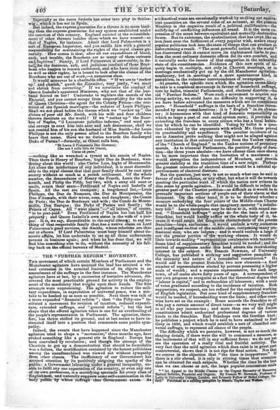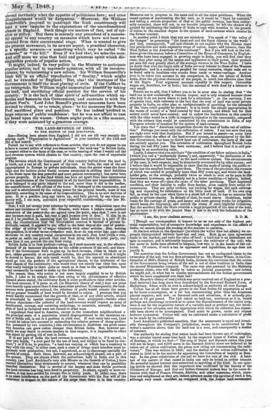TIIE " FURTHER REFORM" MOVEMENT.
TnE movement of which certair(Members of Parliament and the Manchester agitators have assumed the lead has attained a vir- tual extension in the nominal limitation of its objects to an amendment of the suffrage in the first instance. The Manchester agitators have at last, by a succession of tentative advances, dis- covered the most practicable ground for activity in the employ- ment of the machinery that weighs upon their bands. The first attempts were unpromising. The agitation to reduce the mili- tary expenditure, in expectation of universal peace, was a mis- take to be hushed up as soon as possible. Next there was talk of a more expanded "financial reform "; then " the Fifty-one " in- stituted a movement for revision of taxation, reduced expendi- ture, extended suffrage, and "general reform "; but the last shape that the offered agitation takes is one for an overhauling of the people's representation in Parliament. The agitation, there- fore, has thrice shifted its ground, and at last seems to have in- sinuated itself into a position that commands some public sym- pathy.
Indeed, the events that have happened since the Manchester agitators tried to shape a "movement," three months ago, have evoked something like a general stir in England : Europe has been convulsed by revolution ; and though the attempt of the Chartists to get up a demonstration that should be formidable was a failure, the mortification sustained by the honest politicians among the unenfranchised was viewed not without sympathy from other classes. The inefficiency of our Government has aroused attention by its positively outgoing the apathy of the public : a Government labouring under a general incapacity, un- able to fulfil any one expectation of the country, or even any one of its own professions, is a mortifying spectacle for every class of Englishmen, and naturally suggests some self-examination in the body politic by whose suffrage that Government exists. As asishmetical sums are occasionally worked by striking out equiva- lent quantities on the several sides of an account, so the present Ministry is the negative result of a political nullification— the nullifying of conflicting influences all round. It is the mere ex- pression of the mean between equivalent and mutually-destructive forces. But its existence, the neutralization that has crept like an iron frost over the fulfilment of every popular wish, makes every popular politician look into the state of things that can produce so disheartening a result. " The most powerful nation in the world" has discovered that it cannot move its nightmared limbs to per. form the most ordinary domestic offices for its own comfort, and it naturally seeks the causes of that congestion in the unhealthy state of the constituencies. Evidence of this new spirit of in- quiry begin to multiply, not only in Chartist meetings, or in meetings mechanically got up by the old Manchester agitation. machinery, but in meetings of a more spontaneous kind, in pamphlets, in the volunteer correspondence of newspapers. At present, the specific turn which the agitation seems likely to take is a combined movement in favppr of household suffrage, vote by ballot, triennial Parliaments, and electoral districts—the old " Further Reform." Were such a movement to acquire any living activity, we could have no difficulty in supporting it, as we have before advocated the measures which are its constituent parts. " Household " suffrage is the basis of a franchise recom- mended by many considerations : it is " English" in its charac- ter ; it harmonizes with that kind of domestic responsibility on which so large a part of our social system rests ; it provides for extending the franchise to every citizen who has a local habita- tion by which he can be identified. Voting by ballot is a ques- tion exhausted by the arguments with which Mr. Grote proved its practicability and expediency. The peculiar incidents of its use in America prove nothing that might not be alleged against any institution in that colonial country, from the Yankee version of the "Church of England" to the Yankee notions of pecuniary morals. As to triennial Parliaments, the positive fixity of dura- tion—the three years absolute—we have oftener than once shown to be more important than the limitation of a maximum : it would strengthen the independence of Members, and provide greater stability at the transition time of a new reign. Perhaps the greatest corrective of electoral abuses would be a rational ap- portionment of electoral districts. But the question, just now, is not so much what can be said in favour of such a scheme, or any other, but what it will do towards meeting the particular want of which the nation now evinces its dim sense by gentle agitation. It would be difficult to refute the greater part of the Chartist petition—as difficult as it would be to persuade important sections of people out of their alarm at that document. On the other hand, it is to be doubted whether a measure embodying the four points of the Middle-class Charter would be to the whole people that imaginary monster "a satisfac- tory bill." Large exceptions maybe taken to it, with sound rea- son. " Household suffrage" might do for the basis of a new franchise, but would hardly suffice its the whole body of it, be- cause it would retain the clang-ere* characteristic of the present franchise—large exclusions : it would exclude a very numerous and intelligent section of the middle-class, comprising many pro- fessional men, who are lodger's ;:slesd it would exclude a large if not the greater portion of thb-trtirking classes. It would do little towards making " representation coextensive with taxation." Some kind of supplementary franchise would be needed; and the revival of suggestions under this head attests the reawakening interest in the subject. Mr. Francis Newman, of University College, has published a striking and suggestive pamphlet on the necessity and nature of a remodelled constitution.* He would add to the present franchise two new elements—a fixed number of representatives elected by persons possessing a higher scale of wealth ; and a separate representative, for each large town, of all males above forty years of age. A correspondent of
our own proposes to recognize as a fact the theoretical dogma that "labour is capital," and to enfranchise all labourers ; with a scale of votes graduated according to the incidence of taxation. Both
suggestions, we suspect, are too refined for the empirical working of English legislation. But some kind of supplementary franchise
would be needed, if householding were the basis; and other coun- tries have set us the example : Rome accords the franchise to all who pay a certain amount of direct taxes—as we very well might to all who pay income-tax ; and more than one of the Italian constitutions admit authorized professional degrees of various kinds to the franchise. Earl Stanhope cuts the Gordian knot:
he publishes a project which he is said to have submitted to Earl Grey in 1830, and which would establish a sort of classified uni- versal suffrage, to represent all classes of the people.
The difficulty which we perceive, however, is not so much:the shaping details, if there were the will to command a measure, as the incitement of that will in any sufficient force : we do not yet see the operation of a really vital and fruitful activity. The very fact that the mild agitation which does exist is in great part controversial, shows that it is not ripe for final action. Not that
we concur in the objection that "the time is inopportune." If there is a stir abroad, it is only in stirring times that attention can be obtained for such subjects. Whether the time be the best that we can choose or not, the large popular concessions made * "An Appeal to the Middle Classes on the Urgent Necessity of Numerous Radical Reforms, Financial and Organic. By Francis W. Newman, Professor of Latin in Unhersity College, London, and formerly Fellow of Ballot College, Ox- ford." Published as a shilling pamphlet by Messrs. Taylor and Walton. abroad inevitably whet the appetite of politicians here ; and utter disappointment would be dangerous. Moreover, Sir William Somerville's proposal to quadruple the Irish constituency will lend a new impulse to the expectations of the unenfranchised classes in England. Such things are matters of fact, not of opi- nion or policy. But there is scarcely any precedent of a success- ful appeal to any country on measures which have not been ex- tricated from their controversial stage. What is wanted to give the present movement, in its newest aspect, a practical character, is a specific measure—a something which may be called "the measure," or " the bill." Even if we bad that, we miss the men. And still more we miss that bold and generous spirit which dis- tinguishes periods of popular action. It might, indeed, be very politic in the Ministry to anticipate popular action, and to supersede agitation, with all its inconve- niences, by volunteering a new reform. Sir William Somerville's Irish bill is an official repudiation of " finality," which might well be extended to England. But, alas! the inertness of the Government is itself the most glaring of evils. If the Carifilet be too retrograde, Sir William might immortalize himallthy taking the lead, and sacrificing official position for the service of his country. It is the lack of that spirit of self-sacrifice which en- feebles and benumbs this Government, and contrasts it with Sir Robert Peel's. Lord John Russell's greatest measures have been devised to obtain or to retain, place : to his measures Sir -Robert Peel sacrificed Place and position. He has indeed- profited in large returns of public confidence : but he was not afraid to cast his bread upon the waters. Others might profit in a like manner, if they were animated by a generous courage.



























 Previous page
Previous page